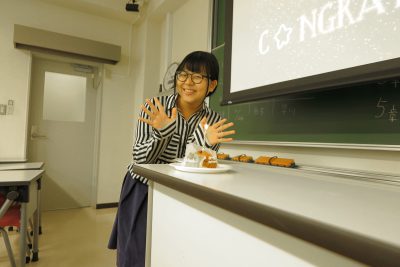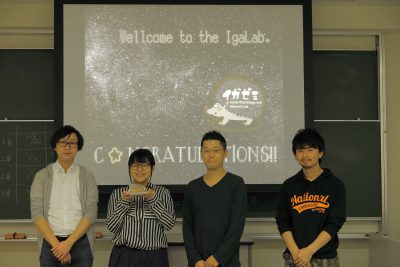お知らせ // 論文・書籍
“Asian Journal of Social Psychology”への論文掲載が決定しました
"Asian Journal of Social Psychology"に、以下の論文が掲載されます。感謝感情の喚起がペイ・フォワードや恩送りといった第三者への利他行動を促進するプロセスに、関係性欲求の充足が介在することを明らかにしました。
Shiraki, Y., & Igarashi, T. (2018). “Paying it forward” via satisfying basic human need: Need for Relatedness satisfaction mediates gratitude and prosocial behavior. Asian Journal of Social Psychology.
People who receive kindness tend to feel gratitude and act in a prosocial manner toward third persons (i.e., “paying-it-forward”). Combining the separate evidence that (1) gratitude leads to the formation of strong psychological bonds from a beneficiary to a benefactor; and (2) people become more prosocial toward strangers when the Need for Relatedness (NFR) is satisfied, two online experiments were conducted to examine if NFR satisfaction mediates the association between gratitude and prosocial behavior toward third persons. After evoking gratitude by recalling past experiences (Study 1) or writing a letter to someone (Study 2), participants were asked to make a donation from their remuneration for the experiment to a charity organization. As predicted, emotion manipulation promoted donation via feelings of gratitude and satisfied NFR. Implications of the current model to integrate previous findings are discussed.
この記事へのリンク | 2017-12-4
ASNAC2017で発表を行います
2017年11月28日~29日にかけて開催されるThe 2nd Australian Social Network Analysis Conference (ASNAC 2017) (Sydney, Australia) で以下の発表を行います。
Oral Presentation
Igarashi, T, Kato, J, Shiraki, Y, Hirashima, T, & Tamai, R (2017). Chasing stars and confirming alliance: Two effective strategies for learning social network structure.
This study reports a novel technique that unveils the process for learning social network structure. In an online experiment, participants were asked to remember and recall the structure of a directed social network (i.e. a set of influence relationships among employees in a company). Participants were shown a list of names of nodes and asked to remember information about who (source) influences whom (target) in the network with a time limit. The information appeared on the display only when participants hovered the mouse pointer over a source node; in other words, participants needed to collect source-target information across all nodes in an efficient way. A social network stimulus was generated at each experimental session based on a random graph varying in three properties: size (5 to 20), density (.05 to .20), and the degree of reciprocity (0 to 1). Analysis of patterns of mouse tracking/fixation across nodes in a generalized linear mixed modeling (GLMM) framework revealed two fundamental strategies that significantly increased a recall rate of whole network structure. The first was a “chasing stars” strategy, or spending more time to remember active (more influential) nodes than inactive (less influential) odes. The second was a “confirming alliance” strategy, or searching pairs of nodes forming reciprocal relationships, and was notably efficient to improve the performance in the learning task of large social network structure. The current findings suggest that the exploration of information-searching processes for social network learning has potential to understand the nature of network schema/bias.
この記事へのリンク | 2017-11-27
2017年度・第2回名古屋社会心理学研究会のお知らせ(12月16日)

2017年度第2回名古屋社会心理学研究会(NSP)を以下の通り開催します。発表者は滋賀大学経済学部の竹村幸祐氏です。
本研究会への参加は無料であり、どなたでも自由にご参加いただけます。また、事前連絡も必要ありません。多くの皆様のご参加をお待ちしています。
日時
2017年12月16日(土)15:00-17:00
場所
名古屋大学教育学部2F 第3講義室
発表者
竹村幸祐 氏(滋賀大学経済学部)
タイトル
集合的問題解決の一環としての相互独立性
概要
本発表では、文化心理学の中心概念のひとつである「相互独立性」が、協力行動とどのような関係を持つかを分析した研究を報告します。相互独立性とは、自他を切り離して考える傾向を指し、国や地域による差がある(e.g., 北米で東アジアより高い)ことが知られています。こうした国・地域の差は「文化」、すなわち、ある種の集合現象の中で生じていると仮定されてきました。しかしながら実際には、集合プロセスの中に相互独立性を位置づけて理解しようとする試みは、これまで十分になされてはいませんでした。発表者は、協力関係の中で相互独立性が果たす役割に注目することで、これに迫ろうと考えています。
この研究では、2種類の協力行動に注目しています。ひとつが、資源獲得における不確実性への集合的対処としての共同分配への協力(Kameda, Takezawa, Tindale, & Smith, 2002)です。もうひとつが、集団意思決定への協力(e.g., 提案行動; Kameda, Tsukasaki, Hastie, & Berg, 2011)です。これらはいずれも、集団メンバーが相互に独立である時に十全に機能するはずで、ここで相互独立性が一定の役割を果たすと考えました。発表では、漁業者を対象とした社会調査や大学の部活動についての調査の結果を報告します。
この記事へのリンク | 2017-11-14
五十嵐ゼミの卒論生の大学院合格をお祝いしました
五十嵐ゼミの卒論生(早川美歩さん)が大学院に合格されました。
そこで、五十嵐ゼミの院生一同でお祝いをさせて頂きました!

様々な種類のケーキを用意し、選んでいただきました。
早川さんにもご満足いただけた様子。

ローソクも用意し、早川さんに吹き消してもらいました!

改めまして、早川さん大学院合格おめでとうございます!!
これからもよろしくお願いいたします!
この記事へのリンク | 2017-11-2
「社会心理学研究」への論文掲載が決定しました
「社会心理学研究」に、以下の論文が掲載される予定です。
佐藤有紀・五十嵐祐 (2017). 制御焦点と向社会性:囚人のジレンマ課題を用いた検討 社会心理学研究, 33, 93-100. PDF
和文要約
本研究は、社会的ジレンマ状況において、制御焦点が協力への選好および向社会性に及ぼす影響を検討した。実験参加者は制御焦点の操作を受けた後、伝統的な囚人のジレンマのシナリオにおいて、協力(黙秘)もしくは非協力(自白)を選択した。この意思決定は、仮想的パートナーの選択がわからない同時手番と、パートナーの選択が明らかになっている逐次手番の2通りの状況においてなされた。分析の結果、予防焦点群の参加者は、促進焦点群や統制群の参加者と比べて、同時手番での非協力率が高く、逐次手番では相手の選択に関わらず一貫して非協力を選択する割合が高かった。これらの結果は、社会的ジレンマ状況において、予防焦点が協力への選好を減退させ、利己的な意思決定を駆動することを示すものである。
この記事へのリンク | 2017-11-1